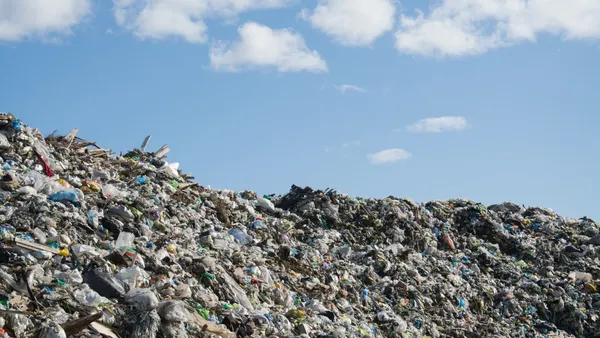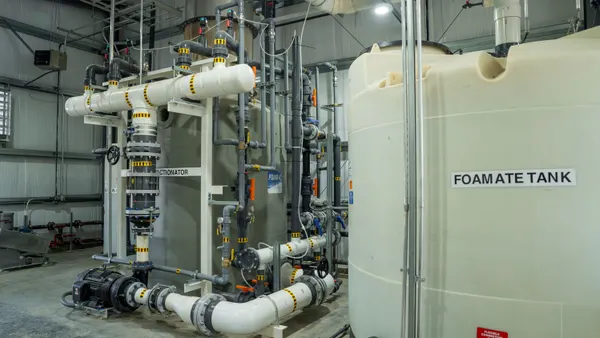Dive Brief:
- Illinois governor Gov. J.B. Pritzker has vetoed a bill meant to prevent the incineration of PFAS, saying in a letter that the bill's definition of “incineration” was overly broad and would unintentionally prohibit companies from using other types of pollution control devices and inadvertently increase air pollutants.
- Pritzker urged the legislature to quickly update the bill language, saying a restriction on incinerating PFAS is “necessary to address the legitimate concerns of environmental justice communities too often exposed to the consequences of industrial pollution.” Stakeholders and lawmakers are working on changes they hope will be introduced when the legislature reconvenes in the fall, the Sierra Club said.
- The Sierra Club and other supporters of HB3190 said the legislation could have had a particular impact on an incinerator in Sauget, Illinois, run by Veolia Environmental Services. The facility has a permit to incinerate firefighting foam known to contain PFAS, but both the environmental group and Veolia say the incinerator is not currently accepting the material.
Dive Insight:
Scientists, the waste industry and environmental activists have all grappled with the potential impacts of using incineration to dispose of per- and polyfluoroalkyl substances (PFAS). Some experts think incineration is the most effective way to destroy PFAS’s chemical bonds, but several environmental groups worry about the potential for PFAS to escape through air emissions and sicken nearby communities.
Last year, New York banned the incineration of PFAS-laden aqueous film-forming foam (AFFF) over concerns that an incinerator in Cohoes, New York, run by Norlite Corp. was the source of PFAS in soil and surface water tested near the site. Lawmakers have also considered regulating PFAS on the federal level with bills like the the PFAS Action Act, which would ban incineration of firefighting foam and set a deadline for the U.S. EPA to designate certain PFAS as hazardous substances.
Supporters of HB3190 — which include the Illinois chapter of the Sierra Club and community group United Congregations of Metro East — said incinerators are disproportionately located in lower-income areas and communities of color, and operators have not proven they can protect residents living closest to the facilities.
The vetoed bill was intended to eliminate the thermal destruction of PFAS, but Pritzker said the wording in the bill would have unintentionally restricted companies from using other methods, such as thermal oxidation. The result could have caused an increase in harmful emissions such as greenhouse gases, PFAS, fluorides, volatile organic materials, carbon monoxide and other “hazardous air pollutants,” he said in his veto letter. Pritzker's letter also referenced an unnamed “Illinois company” that could see greenhouse gas emissions triple if it became subject to the law as written.
The governor called for the legislature to “quickly pass language that rectifies these issues and bans the incineration of PFAS at commercial waste incinerators.” Pritzker's office, the Illinois Environmental Protection Agency and community stakeholders such as the Sierra Club and United Congregations of the Metro East are part of the ongoing discussions to update the bill.
“We are confident that Governor Pritzker shares our goal of protecting Metro East communities from the incineration of toxic PFAS and encouraged that his administration is preparing new legislation to do just that," said Nicole Saulsberry, state government representative for the Sierra Club’s Illinois chapter, in an email. The bill's sponsors have not yet responded to a request for comment.
Neighbors in the nearby Metro East region called for action when they learned the Veolia facility could accept PFAS-containing firefighting foam from military installations for incineration. The federal government has previously considered incineration a preferred disposal method for such waste.
Veolia and other companies with thermal treatment technology have expressed interest in PFAS management as a business opportunity. Veolia has said its clients sometimes require disposal of items that might contain PFAS, which is thought to be present in everything from food packaging to home products. It’s unclear how much PFAS could be in other materials Veolia's Sauget facility handles.
Landfill and incinerator operators currently have few clear choices for disposing of or destroying PFAS. While recent interim guidance from the EPA lists several methods, it considers thermal treatments, such as commercial incinerators and hazardous waste combustors, as having a high level of uncertainty around their impact on the environment. Meanwhile, methods such as injecting liquid PFAS into deep wells or storing PFAS in hazardous waste landfills and solid waste landfills are listed as having less environmental uncertainty.
The Sierra Club, along with United Congregations of Metro East and other groups, sued the Department of Defense in 2020, alleging that the agency entered into three regional AFFF incineration contracts without confirming that the incineration process wouldn’t release toxic chemicals that could hurt nearby residents. Veolia was not part of these contracts, but the company is on a list the DOD's contracting sub-agency, the Defense Logistics Agency, considers a "qualified facility" where AFFF may be sent.
The incinerator in Sauget has not burned any PFAS firefighting foam from the Defense Department.
“Even though materials containing PFAS remain unregulated, Veolia North America has made a voluntary decision not to accept materials that have been identified as containing PFAS at our Sauget, Illinois facility,” wrote Donna Ayer, director of corporate communications for Veolia North America, in an email. “We continue to look to regulatory authorities for guidance on this topic and remain committed to maintaining our record of full compliance in the safe and reliable disposal of hazardous materials.”
Cheryl Sommer, president of the United Congregations of Metro East, told St. Louis Public Radio in November that her organization received records showing the Sauget plant had not received any foam. In August, Pritzker signed SB561, a bill that phases out the use of PFAS-containing firefighting foam. The Sierra Club and United Congregations of Metro East applauded its passage.











